

Notes on Teaching with Slack – Zach Whalen. Slack is communication software popular for handling workplace information flow, project management, customer support, and all kinds of other things.
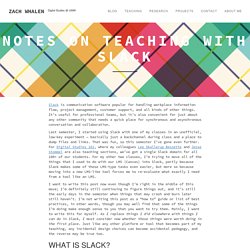
It’s useful for professional teams, but it’s also convenient for just about any other community that needs a quick place for synchronous and asynchronous conversation and collaboration. Last semester, I started using Slack with one of my classes in an unofficial, low-key experiment — basically just a backchannel during class and a place to dump files and links. That was fun, so this semester I’ve gone even further. One final nail in the Learning Styles coffin… We have scotch’d the snake, not kill’d it: She’ll close and be herself, whilst our poor malice Remains in danger of her former tooth.Shakespeare, Macbeth Just when you think you’ve found a way to put the tortured soul of Learning Styles out of its pitiful misery, it lurches horribly back to life.
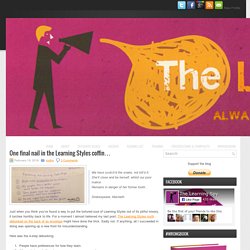
For a moment I almost believed my last post, The Learning Styles myth debunked on the back of an envelope might have done the trick. Sadly not. If anything, all I succeeded in doing was opening up a new front for misunderstanding. Neural Activity in Quickest Learners Differs From the Slowest. A team of researchers, including UCSB’s Scott Grafton, provides new insight into what occurs in the brain during the learning process.
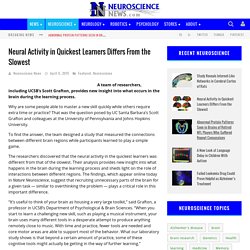
Why are some people able to master a new skill quickly while others require extra time or practice? That was the question posed by UC Santa Barbara’s Scott Grafton and colleagues at the University of Pennsylvania and Johns Hopkins University. To find the answer, the team designed a study that measured the connections between different brain regions while participants learned to play a simple game. The researchers discovered that the neural activity in the quickest learners was different from that of the slowest. (4) The academic manifesto: From an occupied to a public unversity. To falter, as is demonstrated by a large number of comprehensive and thorough analyses.
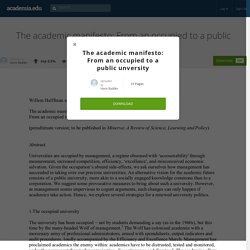
Meanwhile, the sheep endeavour to bring the absurd anomalies of the occupation to the W olf’s attention by means of an endless stream of opinion articles, lamentations, pressing letters and appeals. In turn, the Wolf reduces these to mere incidents, brushes them aside as inevitable side effects of progress, or simply ignores them. Although our description and evaluation were written from the perspective of Dutch universities, the gist of our account (and quite a few details) applies to other countries as well, especially in Europe.
While management ’s. Rubrics for Assessment. Teachers who integrate technology into student activities and projects often ask us this question - “How do I grade it?”
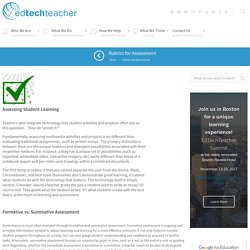
Fundamentally, assessing multimedia activities and projects is no different than evaluating traditional assignments, such as written essays. The primary distinctions between them are the unique features and divergent possibilities associated with their respective medium. For instance, a blog has a unique set of possibilities (such as hypertext, embedded video, interactive imagery, etc) vastly different than those of a notebook (paper and pen notes and drawings within a contained document). The first thing to realize is that you cannot separate the user from the device. iPads, Chromebooks, and tech tools themselves don’t demonstrate great learning; it’s about what students do with the technology that matters. The technology itself is simply neutral. Psychology students struggle to cope with mathematical and statistical demands. Skills in Mathematics and Statistics in Psychology and tackling transition, is one of a series of reports produced by the Higher Education Academy STEM project 2014: Skills in Mathematics and Statistics in the disciplines and tackling transition.
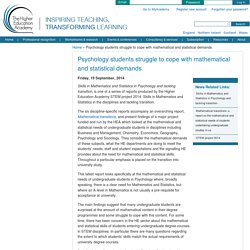
BishopBlog: Some thoughts on use of metrics in university research assessment. The UK’s Research Excellence Framework (REF) is like a walrus: it is huge, cumbersome and has a very long gestation period.
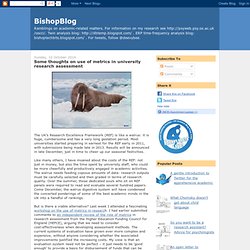
Most universities started preparing in earnest for the REF early in 2011, with submissions being made late in 2013. Results will be announced in late December, just in time to cheer up our seasonal festivities. Howard Gardner: ‘Multiple intelligences’ are not ‘learning styles’ The fields of psychology and education were revolutionized 30 years ago when the now world-renowned psychologist Howard Gardner published his 1983 book Frames of Mind: The Theory of Multiple Intelligences,” which detailed a new model of human intelligence that went beyond the traditional view that there was a single kind that could be measured by standardized tests.
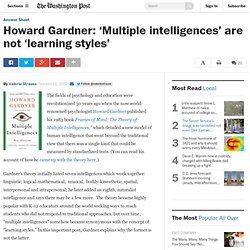
(You can read his account of how he came up with the theory here.) Gardner’s theory initially listed seven intelligences which work together: linguistic, logical-mathematical, musical, bodily-kinesthetic, spatial, interpersonal and intrapersonal; he later added an eighth, naturalist intelligence and says there may be a few more. The theory became highly popular with K-12 educators around the world seeking ways to reach students who did not respond to traditional approaches, but over time, “multiple intelligences” somehow became synonymous with the concept of “learning styles.”
Research assessment, altmetrics and tools for determining impact: Reading list for #HEFCEmetrics review launch. The Threshold Concept. Trafficlifecycle.png (PNG Image, 1160 × 838 pixels) - Scaled (88%) Is not available. Improving student assessment. The issue Effective assessment has greater bearing on successful learning than almost any other factor. Increasing student numbers are adding to marking workloads for staff and students express more dissatisfaction with assessment and feedback than with any other aspect of their learning experience, according to the National Student Survey (2011).
E-learning case studies. Don't show this message again This site uses cookies to allow customisation and to collect anonymous web metrics - how we use cookies Support for...
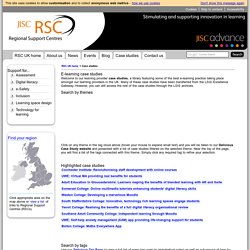
Find your region Click appropriate area on the map above or view a list of links to Regional Support Centres (RSCs). E-learning case studies. Research into teaching excellence published today. Date: 08-10-2013 The first stage of research designed to develop a shared understanding of what is meant by teaching excellence in higher education is published today by the HEA.
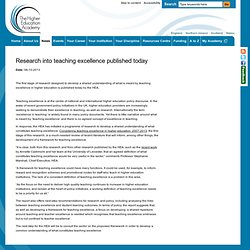
Teaching excellence is at the centre of national and international higher education policy discourse. In the wake of recent government policy initiatives in the UK, higher education providers are increasingly seeking to demonstrate their excellence in teaching, as well as research. Internationally the term ‘excellence in teaching’ is widely found in many policy documents. Flexible learning: a practical introduction for students. The guide aims to provide information about some of the basics of flexible learning with a view to helping students know and understand fundamental issues. It should help students to make informed decisions, be reassured about any uncertainties and anxieties, and have many of their questions answered.
Flexible learning is being widely promoted across the sector as an important form of delivery in the future of HE. Having said this, many students do not fully understand or have experience of non-traditional delivery. Student expectations and perceptions of higher education. Student expectations and perceptions of higher education In 2012 the Quality Assurance Agency (QAA) commissioned King’s College London, led by Dr Camille B. Kandiko, to undertake research into student expectations and perceptions of the quality of their learning experience and the academic standards of their chosen programmes of study. A parallel project took place at the University of Bath under the leadership of Gwen van der Velden, which explored student engagement practices in UK higher education institutions. The changing face of assessment and feedback webinar. Date: 4 December 2013 (1-2 pm) Presenters: Gill Ferrell, Lisa Gray, Anne Jones, Karen Fitzgibbon, Gwyneth Hughes, Julie Vuolo Summary Over the past two years, the Jisc Assessment and Feedback programme has worked with over 30 institutions in the UK further and higher education sector to pilot new approaches that address a range of challenges to better meet the needs of learners, employers and staff.
This webinar will share some of the experiences, approaches and lessons learned from these projects around key themes including: Guides. Student approaches to learning seminar available online. Date: 16-04-2014. Student innovation. Students' experiences and expectations of the digital environment.